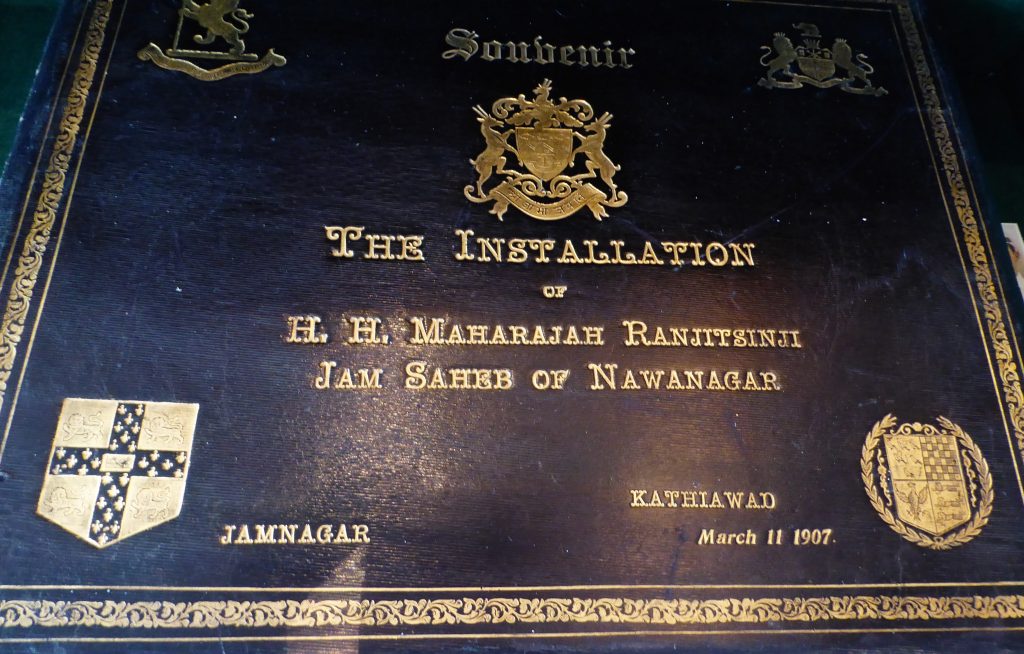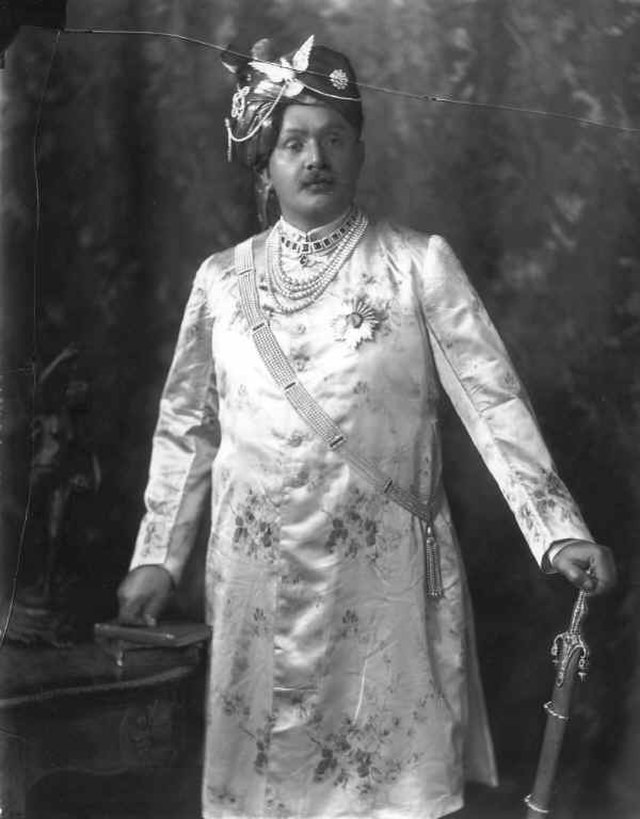
One of the Museum’s Most Interesting Items
One of the most interesting items the Cricket Museum has is an album donated by Ranji which documents his accession to the throne of Nawanagar in 1907. For years, part of the mystique of Ranji was that he allowed people to believe he was an Indian prince. He had been heir to the throne of Nawanager for six years between 1878 and 1884 although he had never been officially adopted. The idea of becoming ruler of the small west Indian state of Nawanagr had taken hold by 1896 and from then Ranji was to do all he could to promote his cause. Playing cricket and becoming the celebrity he was became a means whereby he could promote that cause.
Ranji was born in August 1872 in the small hillside village of Sarodar, thirty five miles south of the capital, Jamnagar. He was born into a family that was a distant branch of the ruling family. Jhalamsinhji, Ranji’s grandfather, was the most senior member of the family. He was a cousin of the current ruler of Nawanagar, Vibhaji. When in 1878, Vibhaji needed to name an heir because he had exiled his son for his dissolute ways, he turned to the Sarodar branch of the family that suggested Ranji who became the heir to the throne and was subsequently sent to Rajkumar to complete his education.
Ranji’s Claim to the Throne

When in 1884, one of Vibhaji’s wives gave birth to a boy, he decided to make him heir to the throne instead of Ranji. Vibhaji had to persuade the British to accept this change but eventually the British relented and in 1884, Jaswantsinhji was named heir to the throne and went through an official ceremony, the like of which Ranji had not gone through. Ranji remained at Rajkumar and was given an allowance to continue his education and even to enable him to go to England to further his education in Cambridge.
By the time that Ranji was due to return to Nawanagar he had become an international celebrity accomplished cricketer and was leading the lifestyle of the landed gentry. Having become an international cricket celebrity, he was to meet not just those who ran the game of cricket abut also those who ran the empire. He was to use his contacts in England and India to further his claim to the throne of Nawangar although when Vibhaji died in 1894 it was Jaswantsinjhi who ascended the throne. When Jaswantsinhji died in 1906 without an heir, Ranji pressed his claim to the throne. Given his western way of life and his support for the British Empire, Ranji was chosen by the British to succeed Jaswantsinhji. Ranji arrived in Jamnagar for his coronation by a special train on the morning of March 1907. It arrived at exactly 6.30 am, the time determined by a committee who decided on the most auspicious moment to arrive. He was dressed in silk, with a jewelled sword belt and a rope of pearls. He stepped out of the train to be greeted by a guard that lined up on three sides of the main square. He was taken by carriage to the summer palace. Crowds lined the streets and banners and flags fluttered from buildings but there were few dignitaries and friends for the state was poor and even much of the furniture for the celebrations had to be borrowed.
The Coronation
None of his English friends were present although some of the more powerful princes who had supported his cause were there including the Maharajay of Patiala, the Maharajahs of Jodhpur, Alwar, Porbander. The Nawab of Junagadh had provided Arab guards to supervise Ranji’s personal safety and the cooking of the food. Telegrams poured in from all over the world and Ranji greeted officials, both Indian and British.
The following day, the 11 March, Ranji was officially installed in an elaborate tent, well decorated with carpets and shawls. After 5pm guns boomed out to announce the arrival of the British Resident, Percy Seymour Fitzgerald, the most important British official in that part of India. In a simple ceremony Fitzgerald made a short speech in which he first welcomed Ranji, referring to his fame as a cricketer and his noble ancestry, before going on to offer words of advice, ‘It will behove you in the present financial circumstances of the State to proceed with caution but as your means permit, you should extend your railway,: irrigation, forestry and the development of the magnificent harbour which you have at Salaya should claim your attention.’ Fitzgerald was making it quite clear what was expected of Ranji.
Ranji was led to the Chair of State and when seated there was a salute of eleven guns after which Ranji offered the words, ‘I hope to abide by the traditions of this State, in its deep unswerving loyalty to the British throne, in which I could not have a better example to look up to than my friend, the famous Sir Pratab Singh, the Maharajah Saheb of Idar.’
The tented camp and all the decorations were taken down as the guests left Jamnagar and Ranji was left to ponder over the state he had inherited, poor, squalid, disease-ridden with little in the treasury.